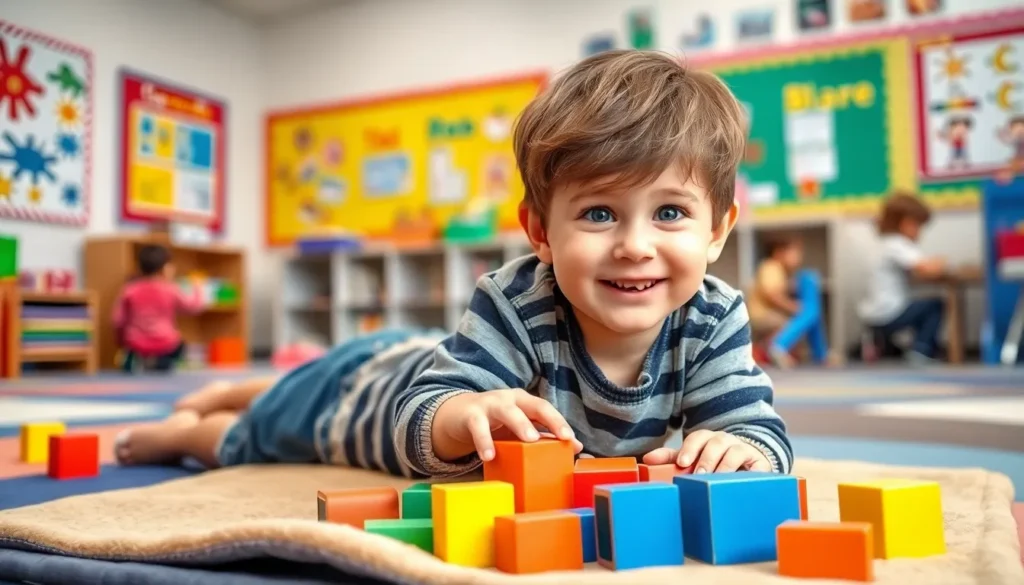Table of Contents
ToggleEvery parent faces the delightful dilemma of deciding when their little bundles of energy should start preschool. It’s a rite of passage filled with excitement, tears, and the occasional existential crisis over whether they’re ready to trade in nap time for finger painting. The age kids go to preschool can vary, but it’s typically around three to four years old.
Understanding Preschool
Understanding preschool involves recognizing its purpose and the developmental benefits it provides. Many educational systems define preschool as early childhood education for children aged three to five years. This stage emphasizes social skills, emotional development, and foundational academics.
Children often experience significant growth during preschool. They learn to interact with peers, follow routines, and express themselves verbally. Programs typically focus on play-based learning, fostering creativity and problem-solving abilities. Curriculum components include language arts, math basics, and motor skills.
Parents may notice variations in preschool enrollment age based on factors such as regulations and personal readiness. Some states allow children to start as young as two and a half years, while others recommend waiting until closer to four. Each child’s unique development may influence the decision; readiness can differ widely among children.
Socialization is crucial at this age. Engaging with peers supports the development of empathy and teamwork. Meanwhile, structured activities lay the groundwork for future academic success. Teachers often guide children through interactive experiences that enhance cognitive and emotional capacities.
Families also benefit from preschool. Parents may gain support and resources, easing the transition to formal education. Participating in parent-teacher partnerships helps create a strong educational foundation. Understanding these components aids families in making informed decisions regarding preschool enrollment.
Key Factors in Preschool Readiness

Determining preschool readiness hinges on several key factors crucial for children’s development.
Social Development
Social development plays a significant role in preschool readiness. Interacting with peers builds essential skills such as sharing and cooperation. Children learn to navigate friendships and group dynamics, fostering empathy and understanding of others’ feelings. Engaging in collaborative play contributes to teamwork abilities, vital for future school experiences. Structured activities, like group projects, often enhance these social skills. Parents can also promote social readiness by organizing playdates, allowing children to practice these interactions.
Emotional Development
Emotional development is equally critical for preschoolers. Recognizing and expressing feelings leads to positive self-awareness. Preschool provides opportunities to develop resilience, as children face new challenges and learn to cope with emotions. Managing separation from parents can instill confidence and independence, crucial for adjusting to the preschool environment. Encouraging open conversations about feelings at home can further support emotional readiness. Understanding how to express themselves helps children communicate more effectively with peers and teachers.
Cognitive Development
Cognitive development significantly impacts readiness for preschool. Engaging in activities that promote early mathematics and literacy skills prepares children for academic challenges ahead. Problem-solving tasks stimulate critical thinking while fostering curiosity about the world. Exposure to various experiences, such as reading and hands-on learning, helps develop foundational skills necessary for school success. Parents can enhance cognitive growth by incorporating educational games into daily routines. Activities like counting objects or discussing stories not only build skills but also create enjoyable learning moments.
Typical Ages for Preschool Enrollment
Determining the right age for preschool often varies. Generally, children enroll between three and four years old.
Variations by Location
Preschool enrollment ages differ significantly based on location. Some states permit children as young as two and a half years old to start. In contrast, other regions may require children to be closer to four. Local regulations influence these variations, impacting how communities approach early childhood education. Parents are encouraged to check with their state’s education department for specific age requirements. Knowing these details supports families in making informed decisions about preschool timing.
Differences in Program Types
Program types also affect preschool enrollment ages. Full-day programs might focus on children aged three to five, while half-day or part-time options frequently welcome younger children. Some facilities cater specifically to developmental stages, offering tailored curriculums for various ages. Parents should consider their child’s unique readiness and the program’s structure. Alignment between the child’s needs and the program’s offerings promotes a smoother transition into preschool.
Benefits of Early Preschool Education
Early preschool education offers numerous advantages for children aged three to five years. Such programs enhance social skills, allowing children to interact with peers and learn cooperation and empathy. In addition, emotional growth becomes evident as children navigate new environments, building resilience and self-awareness.
Cognitive development receives significant attention in preschool settings. Engaging activities promote early literacy and math skills, laying a strong foundation for future academic success. Furthermore, structured routines in preschool teach children important life skills, such as following directions and time management.
Parents also experience benefits from early preschool enrollment. Support systems can emerge through connections with teachers and other parents, fostering a sense of community. Access to resources and information offers parents tools to aid their child’s development effectively.
Preschool education also reinforces the importance of play in learning. Play-based methodologies engage children’s interests, facilitating motivation and curiosity. Through exploration, children acquire problem-solving capabilities and creativity, essential traits for lifelong learning.
Research consistently shows that children enrolled in preschool programs often perform better academically in later years. Academic readiness transitions smoothly into kindergarten, positioning children for future success. Schools frequently observe that preschool attendees adapt more easily to structured learning environments.
Lastly, early preschool education may promote ongoing parental involvement in children’s learning journeys. Strong parent-teacher partnerships are integral components of effective preschool programs. By fostering collaboration, these connections ensure children receive comprehensive support both at school and home.
Determining the right age for preschool is a significant milestone for families. While the typical age ranges from three to four years old, individual readiness plays a crucial role in this decision. Parents should consider their child’s social, emotional, and cognitive development when evaluating preschool options.
Engaging with peers and participating in structured activities can set the stage for future success. By understanding the various factors influencing preschool enrollment, families can make informed choices that best suit their child’s needs. This thoughtful approach not only supports children’s growth but also fosters a positive transition into early education.





